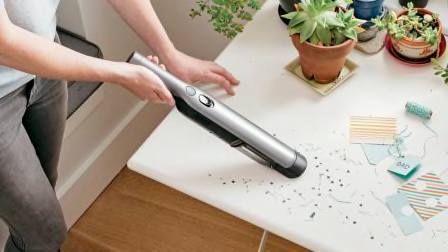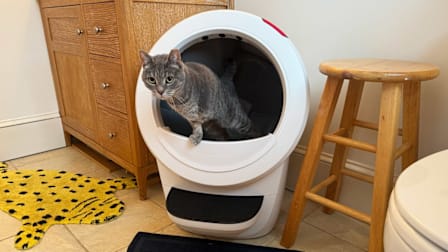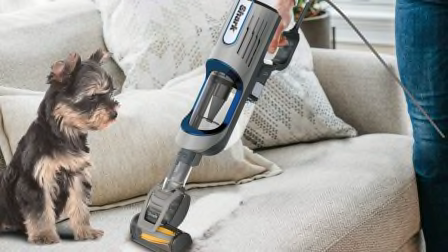We Tried It: Tangle Teezer Pet Brushes
Tangle Teezer’s Ultimate Detangler is one of our favorite brushes for humans. Are the brand's pet hairbrushes just as good?
When you shop through retailer links on our site, we may earn affiliate commissions. 100% of the fees we collect are used to support our nonprofit mission. Learn more.
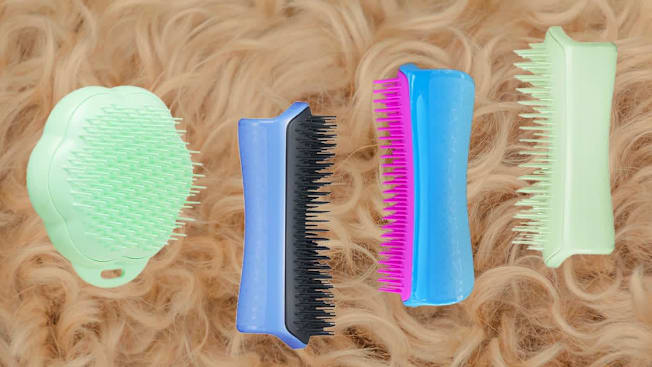
With my own cat at home, I’m constantly picking hair off everything—hard and soft surfaces alike. I find that when I skip brushing my cat’s hair for too many days in a row, Frank leaves more of it behind on his favorite nap spot (the couch) and I have to spend more time lint-rolling my clothes before I go out.
For this reason, I try to keep to a daily brushing schedule most of the time.
- Tangle Teezer's Brushes: Cat Grooming Brush De-Shedding Brush Puppy Brush Detangling Brush
- Benefits to Grooming Your Pets
Some of our four-legged testers were bigger fans of the Tangle Teezer pet brushes than their owners.
Tangle Teezer, which makes one of the human detangling brushes we recommend, recently released four pet brushes. We bought them (as we buy all of the products we test), sent them home with a few colleagues who have pets, and asked for reports about them.
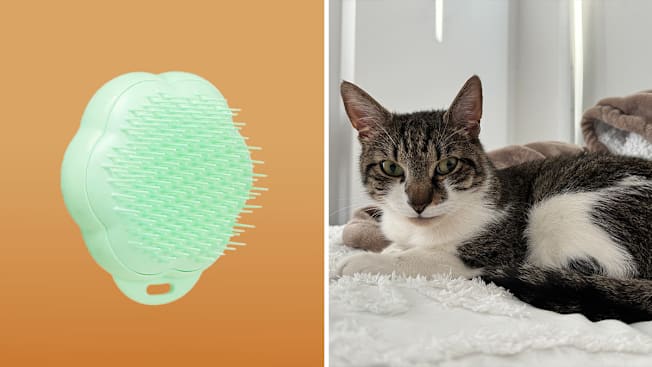
What I liked: My cat, Frank, is an American shorthair but he sheds a full-grown cat’s worth of hair every week around my apartment. So brushing is a daily activity for us. He loves these sessions and will usually let me get every part of him except his belly. Frank seemed as comfortable with the Tangle Teezer Cat Brush as he was with his usual brush. It didn’t cause any pain or discomfort even on the more sensitive parts of his body, like around his ears and under his chin.
Cleaning the brush was easy. All the hair came off in one large clump when I pulled at it.
What I didn’t like: The brush removed a large amount of hair with each pass, but after a few minutes I noticed that most of it was just collected into small clumps that then sat on top of Frank’s body. I could see them floating into the air while I brushed. Then the clumps were all over my floor and couch and stuck to my clothes. I never had this problem with his regular brush. Clumped hair is easier to spot and clean up than loose hair, but I didn’t like having to vacuum right after every brushing session.
And although Frank found the brush comfortable, I didn’t. Its pawlike shape made it hard to keep a firm grip. The brush I normally use has a long handle that’s much more comfortable.
Would I recommend this to another cat parent? Unfortunately, no. My cat was happy with the brush, but the extra cleaning I had to do made it not worth it for me.
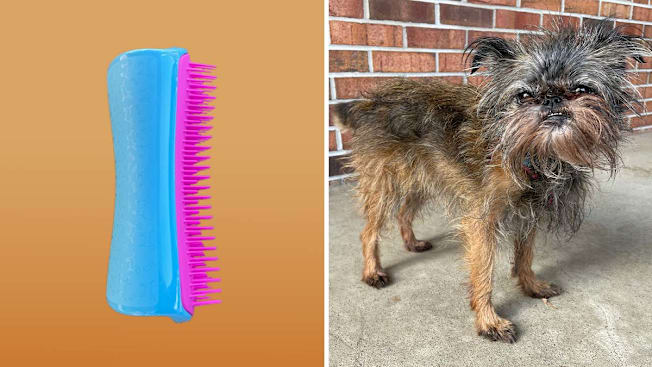
Brandy Collins, CR’s senior director of product and design, used this brush with her Brussels griffon, Doodah, who usually gets groomed every couple of months with a comb that’s supposed to get through her undercoat.
What she liked: Brandy found that the brush was easy to hold and that cleaning the hair off was easy, too.
What she didn’t like: Her dog isn’t a fan of grooming time, and this brush didn’t seem to improve the process compared with her usual brush. Because Doodah is a smaller pup, the size of the Tangle Teezer brush made it difficult to reach around his small neck.
Would she recommend this to another pet parent? No. She didn’t think it worked as well as her usual brush.
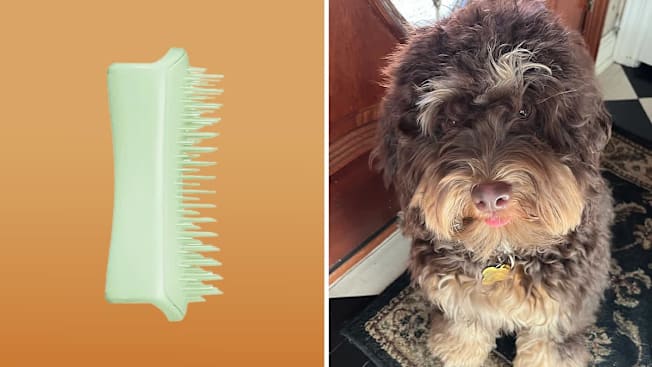
Lauren Kiesel, a senior user experience researcher at CR, tried this brush on her cockapoo (a cocker spaniel and poodle mix) puppy, Benny, who gets brushed every couple of days and after every bath. She usually uses the same self-cleaning brush I use on my cat.
What she liked: Lauren liked that the bristles on the Tangle Teezer Puppy Brush were gentle. “I felt safe brushing his furry face without having to be too delicate, like I’m used to with other brushes I’ve tried,” she said. She also liked that the brush’s shape allowed her to have different grip options on the handle.
Benny seemed not to mind being brushed with the Puppy Brush. He tried to nibble it a few times, but Lauren couldn’t be sure whether it was due to the brush or some other factor.
What she didn’t like: Though Lauren found that the brush could get through light tangles in Benny’s long fur, it couldn’t handle more intensive matting on his leg. To tackle that, she had to pull out a wire brush she owns.
Would she recommend this to another pet parent? Even though Lauren and Benny didn’t prefer this brush overall to their usual grooming tool, she would still recommend it to a friend if it fit their needs.
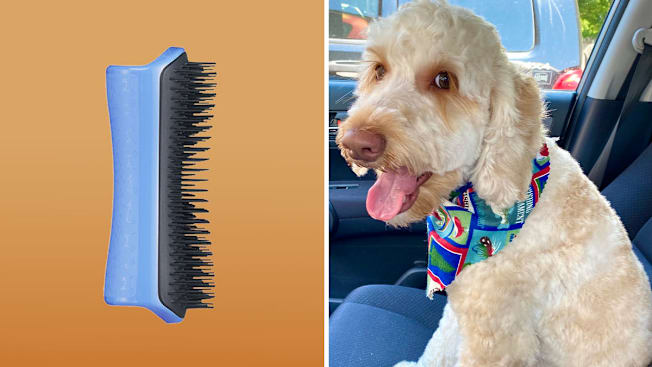
If the Tangle Teezer Detangling Brush has just one fan, it’s the curly-haired labradoodle, Blake, owned by CR writer Lisa Fogarty. He’s usually brushed about once a week with a 2-in-1 combo brush.
What she liked: “This brush is currently Blake’s favorite thing in the world,” she said. “I say, ‘Do you want to be brushed?’ and he comes running to me.” It’s the first time he’s reacted with excitement to being brushed. Even when his ears, which get very curly, are being brushed, Blake remains calm.
Lisa found the brush easy to hold in the palm of her hand. Its width was also helpful in detangling Blake’s fur quickly. Other brushes she’s used have been narrower with fewer bristles, which makes grooming time a longer chore than she’d like. She found that the small bit of hair the Tangle Teezer Detangling Brush picked up from Blake was easy to remove from the brush when she was done using it.
What she didn’t like: Blake doesn’t shed much, so Lisa didn’t think this was a big deal for her, but she noted that this brush doesn’t have any special features to help get hair out of the bristles. For a dog with more shedding than her own, this could be a pain point.
Would she recommend this to another pet parent? Yes! “I love this brush so much,” Lisa said.
Should You Brush Your Cats and Dogs at Home?
I brush Frank to minimize the amount of hair I have to clean up every week, but there are other benefits to brushing pets. “Grooming regularly removes dead hair, distributes natural oils for a clean and healthy coat, stimulates the surface of the skin, and gets rid of dead and dry skin,” says Sarah Bhimani, strategic communications manager for the Animal Humane Society. “Regular grooming also gets you familiar with your pet’s body, so you’ll notice early on if anything is unusual or needs veterinary attention.” She says that the frequency of brushing depends on your pet’s breed and lifestyle, but a good guideline is to brush every couple of days.
If you have brushing-anxious pets at home, Bhimani says to start by letting your pet see and smell the brush before brushing them slowly while rewarding them with treats and praise. “Start with areas of their body that are less sensitive,” she says, “and keep your sessions short at first and increase the length of time as your pet learns to enjoy or at least tolerate it.”

















